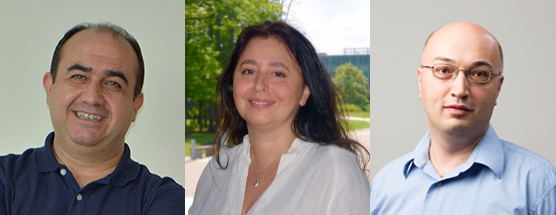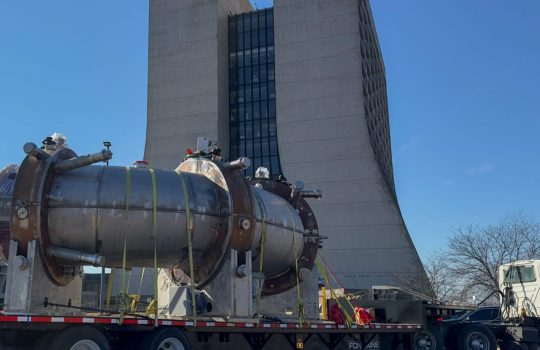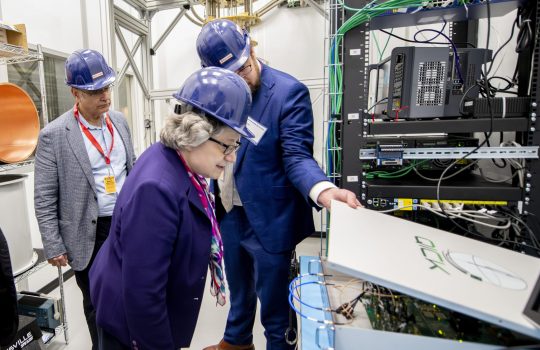The Quantum Horizons: QIS Research and Innovation for Nuclear Science award from the U.S. Department of Energy’s Office of Nuclear Physics has enabled a new collaboration between researchers who develop technologies for nuclear physics, quantum information science and high-energy physics.

From left to right are Mustafa Bal, the lead-PI from the Fermilab-hosted SQMS Center; Anne-Marie Valente-Feliciano from Jefferson Lab; and Adrian Lupascu from the University of Waterloo.
Mustafa Bal, associate scientist at the U.S. Department of Energy’s Fermi National Accelerator Laboratory-hosted Superconducting Quantum Materials and Systems Center, is the lead principal investigator who will coordinate the project, “QIS and nuclear physics technologies for next generation materials and architectures for high coherence superconducting qubits,” funded by the award.
Joining as co-PIs are Anne-Marie Valente-Feliciano, accelerator physicist at the DOE’s Thomas Jefferson National Accelerator Facility, and Adrian Lupascu, a member of the Institute for Quantum Computing and the Department of Physics and Astronomy at the University of Waterloo in Canada.
“Qubits need to live long enough to make meaningful computations. We are excited to partner with SQMS through the Quantum Horizons work to establish better materials that enable longer qubit lifetimes,” said David Dean, Jefferson Lab’s deputy director for science.
The decoherence problem
Aligned with the core mission of the SQMS Center, this awarded proposal seeks to understand and mitigate the loss of quantum information in quantum systems by a phenomenon called decoherence. The decoherence of qubits — devices that harness fragile quantum information — needs to be tackled to fully unlock the power of quantum computers.
The SQMS collaboration brings together dozens of experts in QIS, material science and more to tackle decoherence with the most advanced material analysis tools and qubit foundries.
Building on the SQMS Center’s breadth of expertise and facilities, this award adds Jefferson Lab’s capabilities in producing highly pure niobium films and Waterloo’s experience in designing and measuring different kinds of qubits.
“Our SQMS Center is uniquely positioned to make advancements in the performance of superconducting qubits. We will accelerate towards this goal by exploring new promising and unique pathways,” said Bal. “Through the Quantum Horizon award, we will use the films made by Jefferson Lab to explore material purity as a potential path to improve qubit performance. The experts at the University of Waterloo will expand our capabilities to make other types of qubits.”
Using ultra-high-quality niobium films
Researchers at Fermilab and Jefferson Lab use cavities made of niobium to accelerate particles to near the speed of light. This enables discoveries in high-energy physics at Fermilab and nuclear physics at Jefferson Lab.
Cavities made of niobium are the best in the world, but there is room to maintain high performance while reducing costs by depositing a thin film of niobium on a copper cavity.
“We are developing advanced techniques to produce high-quality, niobium-film-based accelerating cavities. We think these films will also improve the lifetime of quantum information in qubits,” said Valente-Feliciano. “Most niobium films have impurities and are atomically disordered, which might contribute to the loss of quantum information in qubits. Our research at Jefferson Lab is producing atomically ordered, highly pure films with the best properties and performance.”
Lupascu will explore new designs for quantum computing devices made with these films and study the devices’ performance at ultra-cold temperatures. This effort will seek ways to be able to produce these devices, while maintaining high performance and reproducibility across a range of devices, which is important for the scalability of quantum computers.
“One of the main areas of interest in our team is in understanding how well quantum information is preserved in devices. For this process, the quality of materials is essential,” said Lupascu. “The film expertise at Jefferson Lab and the collaboration with SQMS will provide an opportunity to explore new physics and advance quantum devices.”
Advancing nuclear physics and quantum information science objectives by collaborating with important quantum efforts, such as the DOE National QIS Centers, was encouraged in the Quantum Horizon funding opportunity announcement, to leverage and facilitate ongoing intellectual progress in QIS.
“We are delighted that the SQMS Center could provide a framework to advance important nuclear physics QIS goals. These goals are synergistic with the technological advancements our national center is striving for,” said Anna Grassellino, Fermilab senior scientist and director of the SQMS Center. “At the same time, nuclear physics technologies will help SQMS and the QIS community answer key open questions for the field, such as if the level of purity of the films making up superconducting qubits is a main performance-limiting factor. Uniting the world’s top experts in various technologically relevant fields will help the QIS community succeed.”
The Superconducting Quantum Materials and Systems Center is one of the five U.S. Department of Energy National Quantum Information Science Research Centers. Led by Fermi National Accelerator Laboratory, SQMS is a collaboration of 26 partner institutions — national labs, academia and industry — working together to bring transformational advances in the field of quantum information science. The center leverages Fermilab’s expertise in building complex particle accelerators to engineer multiqubit quantum processor platforms based on state-of-the-art qubits and superconducting technologies. Working hand in hand with embedded industry partners, SQMS will build a quantum computer and new quantum sensors at Fermilab, which will open unprecedented computational opportunities. For more information, please visit sqmscenter.fnal.gov.
Fermi National Accelerator Laboratory is supported by the Office of Science of the U.S. Department of Energy. The Office of Science is the single largest supporter of basic research in the physical sciences in the United States and is working to address some of the most pressing challenges of our time. For more information, please visit science.energy.gov.



